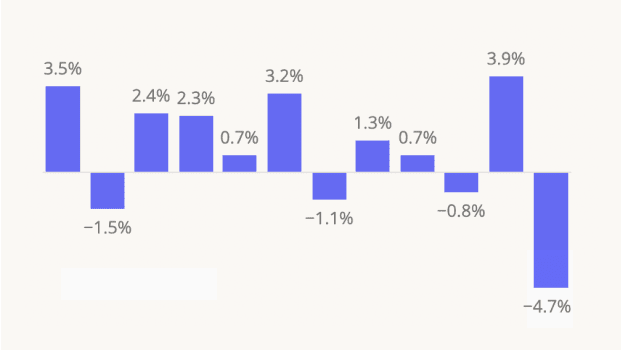Insights into the physical world anchored in location analytics
Article

Article
Aldi & Lidl's Winning FormulaThe Kroger Co, is a leading player in the grocery store space, operating its epon lorem ipsum dolor sit amet, consectetur adipiscing elit, sed do eiusmod tempor incididunt ut labore et dolore magna aliqua. Ut enim ad minim veniam, quis nostrud exercitation ullamco laboris nisi ut aliquip ex ea commodo consequat. Duis aute irure dolor in reprehenderit in voluptate velit esse cillum dolore eu
May 1, 2025
4 minutes

INSIDER
Report
Domestic Migration in 2025: The Great SlowdownDive into the data to explore domestic migration patterns over the past four years – and uncover states and metro areas emerging as relocation hotspots in 2025.
April 25, 2025
6 minutes
Article
Article
Love in the Time of BookstoresThe Kroger Co, is a leading player in the grocery store space, operating its epon lorem ipsum dolor sit amet, consectetur adipiscing elit, sed do eiusmod tempor incididunt ut labore et dolore magna aliqua. Ut enim ad minim veniam, quis nostrud exercitation ullamco laboris nisi ut aliquip ex ea commodo consequat. Duis aute irure dolor in reprehenderit in voluptate velit esse cillum dolore eu
Apr 29, 2025
4 minutes
Article
Article
Dutch Bros Gains, But Starbucks Holds Top SpotThe Kroger Co, is a leading player in the grocery store space, operating its epon lorem ipsum dolor sit amet, consectetur adipiscing elit, sed do eiusmod tempor incididunt ut labore et dolore magna aliqua. Ut enim ad minim veniam, quis nostrud exercitation ullamco laboris nisi ut aliquip ex ea commodo consequat. Duis aute irure dolor in reprehenderit in voluptate velit esse cillum dolore eu
Apr 28, 2025
3 minutes
Industry Trends
Year-Over-Year Visits to Grocery Stores by State
Article

Article
Self-Storage: Resilience in 2025The Kroger Co, is a leading player in the grocery store space, operating its epon lorem ipsum dolor sit amet, consectetur adipiscing elit, sed do eiusmod tempor incididunt ut labore et dolore magna aliqua. Ut enim ad minim veniam, quis nostrud exercitation ullamco laboris nisi ut aliquip ex ea commodo consequat. Duis aute irure dolor in reprehenderit in voluptate velit esse cillum dolore eu
Apr 30, 2025
3 minutes
Article

Article
Aldi & Lidl's Winning FormulaThe Kroger Co, is a leading player in the grocery store space, operating its epon lorem ipsum dolor sit amet, consectetur adipiscing elit, sed do eiusmod tempor incididunt ut labore et dolore magna aliqua. Ut enim ad minim veniam, quis nostrud exercitation ullamco laboris nisi ut aliquip ex ea commodo consequat. Duis aute irure dolor in reprehenderit in voluptate velit esse cillum dolore eu
May 1, 2025
4 minutes
Article

Article
Self-Storage: Resilience in 2025The Kroger Co, is a leading player in the grocery store space, operating its epon lorem ipsum dolor sit amet, consectetur adipiscing elit, sed do eiusmod tempor incididunt ut labore et dolore magna aliqua. Ut enim ad minim veniam, quis nostrud exercitation ullamco laboris nisi ut aliquip ex ea commodo consequat. Duis aute irure dolor in reprehenderit in voluptate velit esse cillum dolore eu
Apr 30, 2025
3 minutes
Article

Article
Love in the Time of BookstoresThe Kroger Co, is a leading player in the grocery store space, operating its epon lorem ipsum dolor sit amet, consectetur adipiscing elit, sed do eiusmod tempor incididunt ut labore et dolore magna aliqua. Ut enim ad minim veniam, quis nostrud exercitation ullamco laboris nisi ut aliquip ex ea commodo consequat. Duis aute irure dolor in reprehenderit in voluptate velit esse cillum dolore eu
Apr 29, 2025
4 minutes
Article

Article
Dutch Bros Gains, But Starbucks Holds Top SpotThe Kroger Co, is a leading player in the grocery store space, operating its epon lorem ipsum dolor sit amet, consectetur adipiscing elit, sed do eiusmod tempor incididunt ut labore et dolore magna aliqua. Ut enim ad minim veniam, quis nostrud exercitation ullamco laboris nisi ut aliquip ex ea commodo consequat. Duis aute irure dolor in reprehenderit in voluptate velit esse cillum dolore eu
Apr 28, 2025
3 minutes

Latest

Article
CAVA and sweetgreen Take to the SuburbsCAVA and sweetgreen are cementing their place as leaders in the fast-casual space. The two chains have seen impressive growth over the past few years, adding new locations to keep up with growing demand. We took a look at their performance over the years to see what might be driving their continued rise.
April 25, 2025
3 minutes

Article
Sinners Fuels Movie Theater Momentum The release of Sinners kept movie theater visits high following the momentum generated from A Minecraft Movie.
April 25, 2025
1 minute

Article
The Impact of QSR Promotions in Q1 2025Using the latest location intelligence, we analyzed RBI, Yum! Brands, and other top QSRs, to explore their Q1 2025 performance and several promotions that had a significant foot traffic impact.
April 24, 2025
3 minutes

Article
Health-Centric Grocers Lead the Way We dive into the visit data for Sprouts Farmers Market and Natural Grocers to see how the two health-centric grocers are performing in Q1 2025.
April 23, 2025
3 minutes

Article
Crafting a Goodbye: What Location Analytics Reveals About JOANN’s DepartureFollowing a second bankruptcy filing, JOANN recently announced a complete shutdown of its fleet. Using location analytics, we uncovered the foot traffic trends behind JOANN’s unraveling and pinpointed retailers that stand to gain from its exit from the arts and crafts space.
April 22, 2025
3 minutes

Article
What Visitation Data Reveals About Industrial Manufacturing Demand Ahead of TariffsVisitation data at manufacturing facilities can shed light on consumer demand and industrial output trends. We dove into the traffic data at a composite of manufacturing facilities across the United States to find out how the potential tariffs are impacting manufacturing output.
April 22, 2025
4 minutes

Executive Insights
All The Things I Think I Think About Retail Over The Last QuarterFind out all the thoughts Chris Walton has had about retail throughout Q1 2025. Which brands are thriving, which are poised for a turnaround, and who may be on the decline?
April 21, 2025
13 minutes

Article
McDonald’s & Chipotle Q1 2025 RecapMcDonald's and Chipotle are staying strong despite economic uncertainty. With Q1 2025 over, we looked at their visit trends and key strategies driving customer traffic.
April 21, 2025
3 minutes

Article
Location Intelligence On Display: A Look at Los Angeles's Top MuseumsLos Angeles boasts several world-class museums that educate and entertain local visitors and tourists alike. We dove into the data for several of LA’s top museums in order to examine the visitation patterns and demographics of museum goers in Los Angeles.
April 18, 2025
4 minutes

Article
3 Insights Into the Shopping Habits of Older Consumers Despite making up over 40% of American adults, Gen X and Baby Boomers are often overlooked by marketers in favor of Gen Z shoppers. We analyzed the latest data to better understand these frequently overlooked consumer segments.
April 17, 2025
4 minutes

Article
Placer 100 Index, March 2025 Recap – Which Chains Weathered the Storm? Foot traffic to the Placer 100 Index for Retail & Dining - the top-performing chains identified by the Placer.ai platform - stabilized in March 2025, with fitness and dining leading the way.
April 16, 2025
3 minutes

Article
The Post-Pandemic Retail Evolution: A look back on the last five yearsHalf a decade has passed since the onset of the COVID-19 pandemic, transforming the retail industry overnight. We took a look back at how some things have changed - and what's stayed the same.
April 15, 2025
10 minutes
Retail




Article
Aldi & Lidl's Winning FormulaA strong value proposition has never been more important to shoppers – and discount powerhouses like Aldi and Lidl are prime examples. We took a closer look at some of the location intelligence to see where the two grocers stand.
May 1, 2025
4 minutes

Article
Love in the Time of BookstoresWe took a look at a Brooklyn-based romance bookstore – The Ripped Bodice – to see what visitation trends reveal about the value of specialty stores in an environment increasingly dominated by general retailers.
April 29, 2025
4 minutes

Article
Health-Centric Grocers Lead the Way We dive into the visit data for Sprouts Farmers Market and Natural Grocers to see how the two health-centric grocers are performing in Q1 2025.
April 23, 2025
3 minutes

Article
Crafting a Goodbye: What Location Analytics Reveals About JOANN’s DepartureFollowing a second bankruptcy filing, JOANN recently announced a complete shutdown of its fleet. Using location analytics, we uncovered the foot traffic trends behind JOANN’s unraveling and pinpointed retailers that stand to gain from its exit from the arts and crafts space.
April 22, 2025
3 minutes
QSR




Article
Dutch Bros Gains, But Starbucks Holds Top SpotVisits to coffee chains like Starbucks, Dunkin,’ and Dutch Bros have been on the rise recently - and smaller coffee chains like Scooters Coffee and 7 Brew are also thriving. We took a look at Q1 2025 traffic to see how the segment is faring.
April 28, 2025
3 minutes

Article
The Impact of QSR Promotions in Q1 2025Using the latest location intelligence, we analyzed RBI, Yum! Brands, and other top QSRs, to explore their Q1 2025 performance and several promotions that had a significant foot traffic impact.
April 24, 2025
3 minutes

Executive Insights
All The Things I Think I Think About Retail Over The Last QuarterFind out all the thoughts Chris Walton has had about retail throughout Q1 2025. Which brands are thriving, which are poised for a turnaround, and who may be on the decline?
April 21, 2025
13 minutes

Article
McDonald’s & Chipotle Q1 2025 RecapMcDonald's and Chipotle are staying strong despite economic uncertainty. With Q1 2025 over, we looked at their visit trends and key strategies driving customer traffic.
April 21, 2025
3 minutes




.png)
.png)

.png)
.png)












.svg)